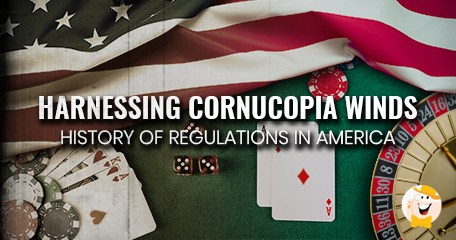
History of regulations in America since colonial spells to wired wells, from gambling hells to iGaming halls, and beyond.
Fifty years after the end of American Revolutionary War, Vicksburg, the town at the confluence of the Mississippi and Yazoo rivers, was about to witness the formative event in the history of gambling regulation in the United States.
Widely known for another pivotal episode in American narrative — the siege by Union forces under General Ulysses S. Grant during the Civil War — Vicksburg was, in 1835, a frontier boomtown known as “the liveliest place on the whole southwest”. The merchants, doctors, lawyers, and cotton plantation owners constituted the emerging elite exercising moral and cultural values that coincided with the fast profits unimaginable elsewhere in the country.
Enjoying in the wave of gambling expansion in America — when legalization was openly discussed before the pressure from legislators directed otherwise — Vicksburg was rampant by the early casinos known as the carpet joints or the gambling hells. The gamblers inundated the town and run, by all accounts, crooked games, mostly faro.
Resolute to put an end to these frontier effronteries, the town’s fathers decided to expel professional gamblers from Vicksburg and its vicinity. With warnings posted throughout the city, intruders were given one day to leave the town. Majority fled terrified by the threat.
Few of them, however, refused and barricaded themselves in one of the hells.
On July 6, the angry mob led by the local militia raided every casino, one at the time, eventually catching up with the entrenched party. Upon forceful entry and number of shots exchanged, the mob captured and hanged five of them at the town square.
Fueling up gamblers’ sins with the alleged murder of a local doctor and partake in the Murrel Excitement — planned slave rebellion sponsored by Northern Abolitionists — the rampage culminated in bodies that dangled from the gallows for twenty-four hours only to be cut down afterward and buried in a ditch.
What Joshua D. Rothman, PhD., described as “a paroxysm of extralegal violence” in the Journal of American History was, in fact, a tough and short-tempered attempt to regulate the gambling in the state of Mississippi.
The continuous and polarizing nationwide efforts to suspend “the epidemic of gambling”, exercised differently, on separate occasions, were typical of antebellum years.
In San Francisco — overflowed with hundreds of gambling hells making it the destination for worldwide gamblers since 1848 and discovery of the gold that huddled together heavily armed men, alcohol, high-stakes games of chance, abundance of riches, and utmost lack of regulations and law enforcement — James King, the editor of Daily Evening Bulletin, conducted vicious campaign targeting notorious gamblers by printing their names in newspapers.
Making it difficult for people to play or associate with players, King’s campaign caused wide divisions among citizens by 1856, for gamblers were viewed as “respectable members of society, not considered as people that took advantage of other people,” according to professor I. Nelson Rose, J.D., Whittier Law School.
John ‘Bet-a-Million’ Gates — an American Gilded Age industrialist, the pioneer promoter of barbed wire, an instrumental figure in changing the steel industry production methods, the president of the Texas Company, later to be known as Texaco, also the fervent and professional gambler — put regulating efforts in a fitting context:
“This is the part of human nature. You might as well tell the wind
to stop blowing as to tell people to stop gambling.”
While Gates was expressing his point of view, the fact may be made that…
…the gambling regulation is a human regulation.
We tend to control our own nature all the time. It is necessary for our overall progress. One cannot be done without the other. The regulations of any kind are, therefore, just a means we use to that end.
We cannot stop the winds.
Be it breeze or blow, only Nature can regulate the movement of air triggered by uneven heating of the Earth by Sun. But…
…we can harness the winds.
The history of gambling regulations in the United States is the story of harnessed winds of human nature.
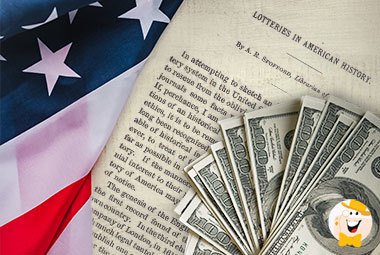
The Fecund Heating
The institution of gambling is embedded in the history of America just as it is incorporated in the American way of life. Equally so, the national resolution to regulate gambling is grounded in moral, cultural, and constitutional values just as the regulatory elements are based on the American progressiveness.
Those two segments — the desire to play at large, and the determination to regulate it — define the dichotomy that shapes the United States gambling legislation since the colonial times.
What we know from Ainsworth Rand Spofford, the sixth Librarian of U.S. Congress, is that the earliest notice of the lottery on the American soil — though not the first — dates back to February 23, 1720.
The ad in American Weekly Mercury in Philadelphia promises the prize in form of the “new brick house, corner of Third and Arch, for which 350 tickets, at 20 shillings each, were to be drawn”.
Lotteries were flourishing public and private business in colonial America that catalyzed the wave of gambling expansion.
“For many years after this practice began to prevail it was not regarded at all as a kind of gambling; the most reputable citizens were engaged in these lotteries, either as selected managers or as liberal subscribers. It was looked upon as a kind of voluntary tax for paving streets, erecting wharves, buildings, etc., with a contingent profitable return for such subscribers…,” Spofford elaborates.
Without lotteries, the colonies would have been built differently, at a slower pace.
Roads, bridges, pavements, buildings, colleges, academies, high schools, public baths, pleasure grounds, paper mills, cannons, land, glass works, channels, charities, churches, lighthouses.
All funded by state lotteries.
They became so common in Pennsylvania that “their attendant evils led to the passage of an act as early as 1729”. The law itself prohibited only unauthorized lotteries. The official ones continued to thrive.
By 1761, people’s willingness to try their luck was on such levels that “the law forbidding them may be said to have proven a dead letter.”
The advertising of lotteries for public baths and pleasure grounds created organized opposition from the clergy and moral figures on the grounds of immorality — the argumentation that will keep repeating itself throughout the regulation history. The efforts resulted in the legislature in 1761, proclaiming both private and public lotteries to be opposed to Pennsylvania’s good.
Not much changed.
In fact, the number of offices for the sale of lottery tickets grew exponentially, from three in 1809, up to more than 200 in 1833. Even the two legislation in between — the act of 1821, that extended the lottery system in Pennsylvania, and the act of 1833, that prohibited all lotteries again — did not alter the picture.
In the end, as Spofford concludes, “in 1843, according to Philadelphia North American, upwards of $30,000 was raised for the purpose of effecting a law to legalize lotteries” in order to enable the state to liquidate its debt.
The fast-changing winds of gambling dichotomy that influenced this on-again, off-again climate — also the repetitive historical occurrence — were harnessed ultimately.
In the span of forty years since the lottery was needed to fund Pennsylvania law to legalize it, thirty-three states had constitutional provisions prohibiting them.
Upon culmination of the maligned Louisiana State Lottery scandal — the first lottery to cross the state borders using the U.S. Postal Service imploding disgracefully after years of corruption in 1883 — the Congress swiftly banned the use of mail system for interstate lotteries in 1890, and the Supreme Court upheld this stature in 1892.
By the end of the century, all of the United States lotteries were outlawed.
And the pattern for all of the future regulations was set.
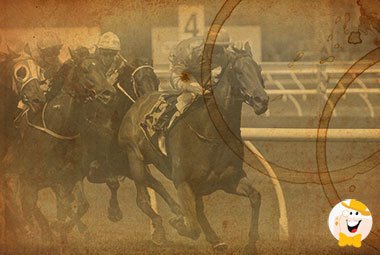
Uneven Flows
Not in stone, though, but in the equestrian dirt that echoed the sentiment on the first coordinated nationwide regulation of gambling — Panta Rei, everything flows.
Present since 1655, when the first racetrack was built on Long Island, the horse racing established itself nationwide momentarily after lotteries dusked away. Hosted on more than 300 racetracks in 1897 — three times more than today — and complemented with the widespread adoption of the telegraph, the horse betting took gambling on the whole new level.
The volume of Americans’ desire to play at large, and the possibilities at hand, is probably best epitomized in George Elsworth Smith.
Known as Pittsburgh Phil…
...the gambler and Thoroughbred racing expert strategist, he became a multi-millionaire by winning large sums of money when racing statistics were scarce. At the time of his demise in 1905, he had amassed $3,250,000 that is equivalent of $90,626,852 today.
The pivotal points for the horse racing gamblers were bookkeepers that set the betting quotas based on the chance of winning. To do so successfully, bookies had to possess the expertise on horses and to set quotas in a balanced manner in order to limit their exposure.
Having players betting against them, and with no regulatory body in sight, they reigned with upper hand and impunity. Compounding the situation were horse staples owned not only by bookkeepers but gamblers too.
Soon enough, the corruption, dubious outcomes, and plain dishonesty became a norm.
Not surprisingly, the regulatory reform movement stepped in.
Enjoying the widespread moralist sentiment at the turn of the century, the horse race betting was outlawed nationwide in 1910, except for few states.
Everything flows.
Ten years later, the winds of the Roaring Twenties and their economic prosperity, lavish style and heroes of the Great War enabled this gambling pastime to reflourish.
In times of Jean Harlow, Charlie Chaplin, Greta Garbo, Babe Ruth, Josephine Baker, Scott Fitzgerald, Coco Chanel, Cecil B. DeMille, and Art Deco, bookmakers found a new way around the prohibiting laws — the bets were kept as verbal agreements between individuals.
Without written records, the anti-betting enforcement was close to null. The regulators were kept out of the loop on the overall value of bets made. The equestrian dirt was writing checks that only likes of Bet-a-Million Gates and Pittsburgh Phil could cash.
It would take the pari-mutuel betting system and the worst economic downturn in the history to take place before the things were cut to size, again.
Invented by Joseph Oller in 1867, and initially implemented on the Kentucky Derby in 1908, the pari-mutuel system collects all bets in one pool and keeps track of wagers, which in turn determines the odds. As bets go up, the quotas go down, and vice versa. Players bet against themselves instead of betting against the bookie in a more balanced system.
As the Roaring Twenties gave way to the Great Depression…
The winds brought a tolerant climate towards gambling not only due to its rampant illegal proportions — a couple of valid bets could buy a new life, presenting too enticing option to many — but also due to ripe awareness of the legalization as a mean to revive states’ economy.
The pari-mutuel system provided for the perfect tool since it allowed states to cut in the bet pot. Before the pot money was to be divided between the horse owners, track organizers and players, the state that ran bets could tax it, creating much needed public revenue.
With the remarkable efficiency, by mid-1930s, twenty-one state legalized on-track horse betting on pari-mutuel system.
In 1934, approximately 15,000 races took place in the United States.
Everything flows.
Except for spherical, rotating objects.
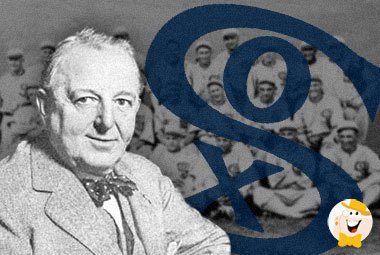
Rotating Matter
When the 1919 World Series volcano erupted — involving eight Chicago White Sox players accused of intentionally losing best-of-nine championship series to Cincinnati Reds — it discharged far-reaching lava and gas that were to shape the American gambling legislation dichotomy for the century to come.
Charles ‘The Old Roman’ Comiskey, the penny-pinching owner of the White Sox, was widely disliked for underpaying his players in the era of the reserve clause that empowered baseball teams to retain the rights to players upon expiration of the contract.
Effectively stripping the players of any negotiating leverage for the duration of the contract while barring them from other professional teams afterward, the reserve clause made the underpaid players susceptible to extra cash offers.
This gambling-prone phenomenon was not to slip past Arnold Rothstein, the shrewd and unscrupulous kingpin of the Jewish Mob in New York City.
Also a voracious gambler, Rothstein was known for his huge scores — $850,000 at Aqueduct Racetrack in the summer of 1921, and $500,000 at the first Dempsey-Tunney heavyweight bout in 1926 — and big losses, such as $270,000 in the single race at Aqueduct in the fall of 1921, and $300,000 in the poker game that led to his murder in November, 1928.
In 1920, the Internal Revenue Service reports that the average citizen’s income was $3,269.40 per year.
Allegedly paying eight White Sox players the total amount of $80,000 — equivalent to $1 million in 2018 — via Joseph J. Sullivan (the instigator of the fix) to deliberately lose the World Series, Rothstein bet against Chicago and made about $350,000, writes Leo Katcher in his book The Big Bankroll.
A year later, when Black Sox scandal broke out, the grand jury was convened to investigate and the trial began in 1921.
“All the records and minutes of the grand jury disappeared, so, too, did the signed confessions,” Katcher writes — leaving the judge with no other choice but to dismiss the case. Eight players were permanently banned from professional baseball and banished from any post-career honors.
Other than almost dismantling one of the most cherished American major sports, the 1919 World Series scandal put the sports layoff betting in limelight. Conceived as a mean to balance out the sportsbook in order to reduce the liability on a certain game, it allowed the bookmakers to place a wager with another bookie thus minimizing the risk as much as possible.
Rothstein was accredited as the probable architect of layoff betting system. When smaller bookmakers faced the threat of imbalanced bets they could not cover, they would call Arnold’s monetary cavalry in. Considering the popularity of betting in those times, it more often than not meant crossing the state borders.
With the advent of long-distance transmissions…
…border crossing was in the shape of the nearest phone booth or telegraph room.
And just like that, the interstate gambling breeze began to build its energy. For the next forty years, it will feed off from warm cables and wires before it will have fuel itself enough to be harnessed.
On the other side of the country, pioneering the tolerant gambling post-Great Depression atmosphere was the state of Nevada. In what would today be tagged as an early adopter, in 1931, it repealed the ban on gambling and relaxed marriage and divorce laws.

Radiating Skies
Until then no one paid much attention to a dirty town in the middle of the desert with a couple of gas stations, junk food diners covered by grease, and few slot machines. At the beginning of the fourth decade of the 19th century, Las Vegas was not an attractive place to do business or to live, with the population of 5,165 souls.
The same year, Pair-O-Dice Club opened on Highway 91 that was yet to become known as the Las Vegas Strip. In 1933, the Prohibition ended with 21st Amendment. Works on the Boulder Dam began in 1935, and in 1938, California cracked down on illegal gambling, causing the exodus of gamblers to Nevada.
In 1939, Ria Langham divorced Clark Gable in Las Vegas, ending eight years of a marriage torn apart by his rising popularity and numerous dalliances, seventeen years of age difference, and riveting affair with Carole Lombard that the public did not see as adulterous but, instead, applauded the romance.
Followed by press on each step, an extramarital affair has threatened to turn into a potential scandal for MGM on the eve of Gone with the Wind production.
Gable was hesitant to accept the role of Rhett Butler. Ria was demanding $300,000 — over $5 million today — as separation pay and requested divorce to be made in California, blocking much anticipated “true love” (as the press christened it) marriage between Carole and Clark since state laws called for a year waiting period before they could do so. The media began to write about “surprisingly slim altar record… on the good old-fashioned, satisfying institution of holy matrimony”.
Revamped divorce laws in Nevada delivered a much-needed solution.
MGM sealed the deal with Gable by giving him an advance on the contract so he could pay Ria. Stripped from the scorned wife sanctuary by the press, she decided to give in. On March 8, 1939, Judge William E. Orr granted the divorce at a court hearing that lasted — four minutes.
Twenty-one day later Gable and Lombard were married.
Las Vegas was christened the divorce capitol of the world. It wasn’t until Captain Guy McAfee of the Los Angeles Police Department, and others, stepped in that it will become the gambling capitol of the world.
Running the LAPD’s vice squad, McAfee was career law enforcement officer with long-time shady operations in illegal casinos circles. When California became too hot to handle in 1938, he quit the force and moved to Las Vegas, paving the way for a long lasting relationship between the city and organized crime.
He acquired Pair-O-Dice Club renaming it 91 Club — the property will subsequently be rebuilt and renamed the New Frontier that will be remembered by the distinctions of hosting the first Las Vegas appearance of Elvis Presley in 1956, and the final performance of Diana Ross in 1970 — and begun legal casino operations premised on an outstanding client relationship management.
Widely credited as the first person to coin the Highway 91 as the Las Vegas Strip, after Los Angeles Strip, McAfee instituted free drinks for customers, getting to know them by their first name, providing them with good time and affordable paraphernalia effectively employing years of experience in managing human nature in conjunction with entrepreneurship spirit.
By doing so, he established a business model for running the legal casino operations. Once it has been proven that it can be done, that legal casino can be highly profitable, the other businessmen and investors followed the suit.
Another wave of gambling expansion in America began.
Until then, Americans looking to gamble legally had to go to Cuba where casinos were plentiful, generating huge profits. All of a sudden optional favorite pastime was much closer.
Then Castro swept Cuba with the Revolution and not even a remote alternative existed.
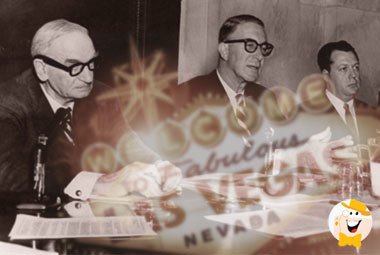
The Alignment Begins
Gamblers from all over America, from all walks of life, flooded the city looking for variety of options in blackjack, poker, roulette, baccarat, faro, and for gaming novelties of slot machines in hotels and casinos wrapped in alluring nightlife, relaxing daytime entertainment, and the mushroom clouds of nuclear explosions at Nevada Test Site which, seen from the downtown, became instant tourist attraction in the 1950s.
By that time, the population of Las Vegas will have increased fivefold to 24,624 people.
Jake Kozloff and Beldon Katleman were amongst the first to invest. So too were Bugsy Siegel, Frank Costello, Meyer Lansky and other organized crime bosses that quickly realized the potential. With no moral, political, and law enforcement opposition to get in the way, Las Vegas provided a lucrative and legal business opportunity.
Proximity to Los Angeles with its glamour and flamboyance provided for steady flow of affluent patrons for rapidly growing casinos financed by Mafia. It would take separate efforts of Howard Hughes, a reclusive and eccentric billionaire, two Democratic Senators from Tennessee and Arkansas, and the youngest of Kennedy brothers — empowered by the might of the United States legislature — to rip out the Las Vegas from organized crime ownership and corruption stranglehold, decades later.
Meanwhile, Frank Costello and Meyer Lansky, Rothstein’s protégée, monopolized off-track betting in horse racing.
With states holding the firm grip on the on-track betting through pari-mutuel system in partnership with race tracks, the off-track betting was illegal. Aided by wire-based electrical systems in place Costello and Lansky expanded operations spreading across the states in a clandestine bookkeeping telecommunications operation.
Convinced that proceeds from this endeavor were used to sponsor other organized crime activities, the federal government decided it was the time to step in.
Led by Estes Kefauver, Tennessee Senator from Democratic Party, the Senate Special Committee to Investigate Crime in Interstate Commerce — known as Kefauver Committee — was established in 1950, with a mandate to investigate connections between interstate gambling and organized crime.
Hearings were held in fourteen cities and over six hundred testimonies were heard, including high-profile crime bosses and the number of politicians.
Further popularized by another technological invention — the television — hearings officially introduced the Mafia to many Americans for the first time and allowed Kefauver to enjoy in publicity that will put him in a vice presidential candidate seat on Adlai Stevenson’s re-match ticket against incumbent 42nd POTUS, Dwight D. Eisenhower, in the 1956 United States presidential elections.
While televised hearings proved to be highly popular with the viewers, they failed to connect gamblers and bookkeepers with organized crime — two outliers in the spectrum of games based on luck, since, as any player will attest, there is nothing more frowned upon than a fixed game.
Kefauver Committee did, however, dig out the malign scheme of points shave in sports betting that existed in college basketball, the most popular sport in the country at the time.
Salvatore Solazzo, a Long Island jeweler, was marked as businessman who allegedly bankrolled the fix that involved several college teams — on the same principles as 1919 World Series scandal, by enrolling low paid players to underperform in exchange for money — and had a devastating impact in New York City, driving City College of New York out of Madison Square Garden for decades.
The hearings also set the stage for the significantly more voluminous committee with much broader subpoena powers. Its actions will have resulted in a plethora of federal laws designed to thwart organized crime grip to gambling.
The small interstate breeze of Rothstein’s time that fed off from heated wires and gambling surfaces across America has built itself into the blowing force with significant kinetic energy.
It was harnessing time.
John McClellan, a U.S. Senator from Arkansas, and Robert F. Kennedy, the 64th United States Attorney General, accepted the job opportunity gleefully.
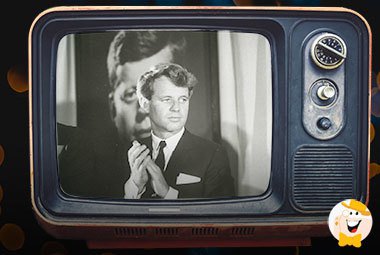
Harnessing Wires
At the end of the 1950s and the turn of the 1960s, the day of average American citizen was filled with topics of Red Scare, civil rights, technological breakthroughs, the space race, organized crime, women’s rights, Elvis and Beatles, baby boomers’ idealism, young senator from Massachusetts that will have soon won the nation’s highest office, race equality, divisions between liberals and conservatives on differing perceptions of patriotism, drugs, sexuality, abortion.
Mirroring this narrative of contrasts were Teamsters, trade unions, improper practices in labor-management relations, their correlation to intimidating activities, and criminal malfeasances of their leaders.
Resolved to investigate a wide range of labor unions, corporations, and organized crime that openly defied authorities, the U.S. legislature established the United States Senate Select Committee on Improper Activities in Labor and Management with a mandate to suggest changes in the laws that were to provide for the suppression of established practices and protection against future occurrences.
Chaired by Senator McClellan, with Kennedy serving as chief counsel and investigator, the Select Committee conducted 253 active investigations, served 8,000 subpoenas for witnesses and documents, and compiled almost 150,000 pages of testimony in 270 days of hearings.
A number of historic legislation came out of the investigation including the Landrum-Griffin Act, a U.S. labor law and the key solution to the initial intentions of the Senate, and, of our particular interest — the Interstate Wire Act of 1961.
Known as the Federal Wire Act, the legislation is probably the combined result of the exploits of both committees, Bobby Kennedy’s declaration of war on crime, the Teamsters control of the Coin Machine Men — the distributor and operator of coin machines that included illegal gambling machines in Oregon — and cumulative outcome of the United States gambling and regulatory history so far.
The Federal Wire Act prohibited interstate betting and wagering through wire-communication by stipulating:
“Whoever being engaged in the business of betting or wagering knowingly uses a wire communication facility for the transmission in interstate or foreign commerce of bets or wagers or information assisting in the placing of bets or wagers on any sporting event or contest, or for the transmission of a wire communication which entitles the recipient to receive money or credit as a result of bets or wagers, or for information assisting in the placing of bets or wagers, shall be fined under this title or imprisoned not more than two years, or both.”
Suppressing nationwide gambling through the only distance medium at the time, the law targeted:
- Individuals that place the bets;
- The organizations that provide for the transmission;
- The individuals or organizations that assist in placing the bets.
It left it to each state to independently regulate its gambling.
Concomitant legislative package also included the Travel Act of 1961 (proscribing the use of mail or a facility to distribute proceeds of unlawful activity between states), the Interstate Transportation of Paraphernalia Act of 1961 (targeting the tools and materials associated with gambling), the Sports Bribery Act of 1964, and — couple of years later, the Illegal Gambling and Business Act of 1970 (enacted as part of Organized Crime Control Act, known as RICO, eyeing larger gambling operations) and the Bank Secrecy Act of 1970 (requiring financial institutions to assist the government in detecting and preventing money laundering).
In elaborating on the essence of the Interstate Wire Act and its aim at cracking down on illegal gambling rings, Robert Kennedy stated:
“This legislation can be a most effective weapon in dealing with one of the major forces of organized crime in this country without invading the privacy of the home or outraging the sensibilities of our people in matters of personal inclination and morals.”
Left to its own devices, true to the pattern established in far removed times of colonial America, New Hampshire legalized lottery in 1964.
The spate of legalizations followed — Connecticut and Pennsylvania in 1971, Rhode Island in 1973, Massachusetts, Illinois and Maine in 1974, New Jersey in 1975, New York in 1978.
By 2016, forty-three states with legalized lotteries and the District of Columbia accumulated for $80.5 billion in sales of lottery tickets.
But back in 1961, as the result of McClellan Committee, the gamblers were left with only Nevada as their pastime haven. And when it comes to hospitality in conjunction with historic opportunities — nobody matches Las Vegas, and its 64,405 residents at the time.

Old Heavyweights, New Robes
Fueled by a steady influx of capital and the advent of the television that popularized sports nationwide, casinos in Las Vegas flexibly begun to adapt oldies-but-goldies to their legalized gambling offerings.
Rothstein era was long gone but his heritage — the sportsbook — was present, ready to be renovated at large. The restorator came in form of professional legalized casino.
Frank Rosenthal provided for a date.
An old acquaintance of McClellan Committee through 37 invocations of the Fifth Amendment and expert strategist on par with Pittsburgh Phil, Rosenthal grew up in Chicago’s West Side hanging around father who owned racehorses. Becoming familiar with betting odds and percentages at an early age, he would often skip classes to hang around the bleachers of Wrigley Field.
Hired by the Chicago Outfit…
...an Italian-American organized crime syndicate — as a prominent sports bettor, oddsmaker, handicapper, and astute gambler, he was involved in a number of bribery charges and match-fixing.
Under local and federal law enforcement spotlight on the east coast, Rosenthal got barred from racing establishments in Florida and moved to Las Vegas in 1968 to run casinos managed by his employers.
Once in legalized state environment, he almost instantly established the first sportsbook within the casino. Hosted by the thriving Las Vegas infrastructure and carried on the rising popularity of television, it turned out into a huge success.
Gamblers left without the possibility to legally gamble in their own states rushed in hordes in Las Vegas, at that time populated with 125,727 people.
Rosenthal’s date between sports and gambling resulted in a legitimate marriage that created yet another wave of gambling expansion in America and provided posterity with heavyweight bouts and spectacles on the scale never seen before.
By mid-1970s, the legally neglected element of sports gambling was at the same level, too.
Despite all federal government efforts the illegal sports gambling not only persisted but went way beyond anything before.
In 1976, the Commission on the Review of the National Policy Toward Gambling — created by the U.S. Congress through the Organized Crime Control Act of 1970 with a mission to study gambling as it exists in America and to develop recommendations for a formulation of gambling policies — released its report.
After three years of research and hearings into the “controversial and divisive subject of gambling”, the report provided for 212 pages of expert opinion on the state of gambling affairs. It starts with the sentence:
“Gambling is inevitable.”
The Commission elaborated its starting point throughout the whole document, including:
“Most Americans gamble because they like to, and they see nothing ‘wrong’ with it. No matter what is said or done by advocates or opponents of gambling in all its various forms, it is an activity that is practiced, or tacitly endorsed, by a substantial majority of Americans... Given this fact of life, the Commission has sought to determine the most productive and equitable treatment of this complex social phenomenon.”
Reflecting on the work done, Charles H. Morin, the Chairman of the Commission, writes in the introduction:
“The Report of the Commission contains a hard statement: ‘Contradictory gambling policies and lack of resources combine to make effective gambling law enforcement an impossible task under present conditions.’ Not ‘difficult’ — not ‘frustrating’ — not even ‘almost impossible’ — but impossible. And why not? How can any law which prohibits what 80 percent of the people approve of be enforced?”
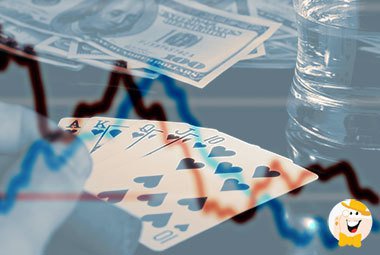
Deregulation Eighties
The major conclusions and recommendations of the Commission were:
- The states should have the primary responsibility for determining gambling forms. The only role of the Federal Government should be to prevent inter-state interference. The Congress should enact a statute ensuring the states’ power to regulate gambling.
- Continued federal efforts against certain gambling operations are necessary and desirable, but some federal statutes should be amended. The civil remedies against gambling violators will ultimately prove to be more successful than current criminal statutes in suppressing illegal gambling.
- Law enforcement practices and efforts by state and local agencies should be directed towards high-level gambling offenses (bookmaking, illegal lotteries) instead of low-level violators that are too often main points of interests.
- While 61% of the adult population participated in some form of gambling in 1974, and 80% of respondents nationwide stated they favored legalization of some form of gambling, all statistical indications from gambling activities in Nevada revealed that the widespread availability of legal gambling increases the gambling population and rate of participation.
- By studying five principal forms of legal gambling — Nevada casinos, pari-mutuel horseracing and dogracing, off-track betting, lotteries, and bingo — the Commission concluded that Nevada regulations are sufficiently stringent with sound regulation, that pari-mutuel takeout (money not returned to bettors) is too high with serious potential conflict of interest when commissioners are allowed to hold financial interests in activities they regulate, that active publicity given to off-track betting induces citizen participation contrary to the public best interest, and that commercial bingo operators running charitable games often retain most of the profits for themselves.
- In a study of illegal gambling, the Commission concluded that large illegal casinos have been virtually eliminated as a result of federal legislation enacted during the 1960s, and rejected the notion that organized crime controls all illegal gambling or that illegal gambling provides revenues for other illegal activities.
In effect — the Commission opined that current state of prohibition should remain in place and that it would be unwise for states to engage in legal sport betting activities.
Sports gambling, thus, remained illegal.
In a parallel development, in a manner of the pattern seen before, New Jersey legalized gambling in Atlantic City in 1977, and the first east coast casino opened in 1978.
As the 1980s unfolded, other activities — organized crime involvement in labor racketeering, corruption of public officials, white-collar crime, and illegal drug traffic — took precedence on the Department of Justice agenda.
Consequently, it put a low priority on enforcement of anti-gambling laws. In 1982, the Washington Post quotes John Russell, the Justice Department spokesman:
“We’re pretty much out of the gambling business.”
Additionally enjoying in deregulation initiatives of Reagan administration and sports availability on cable television…
…illegal gambling volume skyrocketed.
No systematic attempt to monitor sports betting has been made since the report of the Commission in 1976. The DOJ’s last attempt to evaluate the value of illegal activities was in 1972, when the estimated amount was at $29 and $39 billion — equivalent to $174 to $234 billion in 2018.
In the same article, The Washington Post writes that for 1980s “some estimates place the total yearly amount wagered on sports events, excluding horse racing, at $60 billion”, which correlate to almost $183 billion today.
Notwithstanding notoriously difficult process to define exact amount of money involved in illegal gambling of any kind, the figures are, by any measure — staggering.
Short of the Indian Gaming Regulatory Act of 1988, that provided a statutory basis for the operation of gaming by Indian tribes in the United States, the eighties were only to condition future legislation.
For the gambling winds were gusting unharnessed for years.

History Repeated
Henry Hill, an FBI informant, informed the Federal Government on basketball points shave scheme at the Boston College in 1978-79. Five conspirators of the scandal were convicted on charges of RICO conspiracy and sentenced to imprisonment for years.
When Tulane University points shave scandal broke in 1985, three basketball players and five other individuals were indicted. The university’s president, Eamon M. Kelly, announced plans to drop men’s intercollegiate basketball program.
In August 1989, Pete Rose, baseball’s all-time hits leader and manager of the Cincinnati Reds, betted on approximately fifty MLB games in 1987. Major League Commissioner Bartlett Giamatti concluded that Rose “bet on baseball” and banned him for life from the sport.
For the United States Congress, a legislative paterfamilias that gave states the freedom to regulate sports gambling themselves — that was more than enough.
On February 22, 1991, with the full support of the professional sports leagues, four Senators from Utah, Arizona, Pennsylvania, and New Jersey introduced the Professional and Amateur Sports Protection Act, also known as PASPA or the Bradley Act.
The primary arguments for PASPA were:
- To protect the integrity and preserve the character of sports;
- To shield America’s easily influenced youth from the vice;
- To restrict any further spreading of sports gambling in individual states.
With as many as thirteen states considering legalization of sports betting at the time, and historical pattern surely to be recognized by the proponents of PASPA, the law was presented as the mean to protect minors from their participation in betting activities.
Drawing their arguments not only from recent events but from the conclusion of the 1976 Commission — “the widespread availability of legal gambling increases the gambling population and rate of participation” — the NFL Commissioner Paul Tagliabue summed it up best:
“There will be millions of additional Americans induced and seduced into gambling
if this growth industry is permitted to take imprimatur of the state.”
Less than two years after its introduction, on October 28, 1992, President George H.W. Bush signed it into law.
PASPA is relatively simple legislation.
“It shall be unlawful for a governmental entity to sponsor, operate, advertise, promote, license, or authorize by law or compact, or a person to sponsor, operate, advertise, or promote, pursuant to the law or compact of a governmental entity, a lottery, sweepstakes, or other betting, gambling, or wagering scheme based, directly or indirectly (through the use of geographical references or otherwise), on one or more competitive games in which amateur or professional athletes participate, or are intended to participate, or on one or more performances of such athletes in such games.”
That’s it. However, it contains four exemptions:
- The state is exempt if it conducted sports betting between January 1, 1976, and August 31, 1990;
- The state is exempt if it had a statute permitting sports gambling in effect on October 2, 1991, and if sports gambling (as described above) was conducted any time between September 1, 1989, and October 2, 1991;
- The law does not apply to casinos in which sports betting was authorized no later than a year after the effective date of the law, and in casinos that operated sports betting throughout the 10-year period;
- The law does not apply to pari-mutuel animal racing or jai-alai games.
The only four states that fit under first two exemptions — known as the grandfather clause — were Delaware, Montana, Nevada, and Oregon.
The third exemption was meant for Atlantic City but New Jersey failed to enact the legislation within the required timeframe, consequently suffering the greatest economic loss of opportunity. Curiously enough, PASPA is named the Bradley Act for Bill Bradley, New Jersey Senator and a former basketball star that played at Princeton University and for the New York Knicks.
At the time of enactment, PASPA provided a complete solution to primary arguments leading to its introduction. The winds were harnessed again.
Or, at least, they appeared to be so.
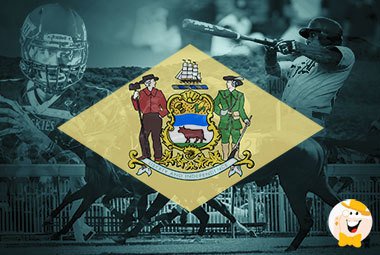
The Crossroads
In the mid-1930s, when states legalized horse gambling on a pari-mutuel system, they did it for a reason — to revive public incomes after the Great Depression.
To no surprise, when the financial crisis of 2007-2008 rampaged through the United States, states begun to look into various sources for their depleted revenue streams. Suddenly, the neglected wells of sports gambling looked quite differently than fifteen years earlier.
Delaware made the first assailment in 2009, when Governor Jack Markell signed a bill granting racetrack casinos the ability to accept sports bets, looking to close the projected $700 million deficit for 2010 state budget. After a flurry of legal action that included major leagues, Delaware District Court, and United States Court of Appeals — arguing on whether Governor Markell’s bill did or did not violate PASPA — Delaware was barred from implementing its plan.
In the same year, New Jersey — influenced by effects of the recession in conjunction with the ghosts of missed opportunity in 1993 — begun protracted legal confrontation with PASPA and the United States courts.
Encouraged in efforts by 2010 referendum that displayed overwhelming voters’ support to legalize sports gambling in the state — further vitalized by the Department of Justice formal legal opinion in 2011, which concluded that “interstate transmission of wire communications that do not relate to a ‘sporting event or contest’ fall outside the reach of” the Wire Act — New Jersey exercised remarkable determination and skill in this legal standoff.
Eight years later — after two state laws with “clever drafting” and endless court hearings at District Courts and Courts of Appeals — in 2016, New Jersey successfully petitioned the Supreme Court of the United States to hear the case.
With only about 1% of all petitions accepted, back in 2012, the SCOTUS declined to hear New Jersey’s arguments. This time, it turned out that New Jersey is not only the Crossroads of the American Revolution but also the crossroad of American gambling regulations history.
In May 2018, in a 6-3 decision, the Supreme Court ruled that the whole of PASPA was unconstitutional.
What made it unconstitutional was a violation of the 10th Amendment, known as commandeering clause, since it illegally empowered the Federal Government to command states’ actions.
The ruling effectively allowed sports betting regulations on a state-by-state basis.
Following up swiftly, in the seven remaining months of 2018 — quite an eventful year overall — seven states joined Nevada in offering wagering on games. Moreover:
- Three states passed sports-betting bills (West Virginia, New Jersey, Road Island);
- Nineteen states considered sports-betting legislation;
- Six partnerships were struck by the NBA, NHL, and MLB with sportsbook operators;
- Forty-nine Las Vegas-style sportsbooks opened outside Nevada, with over half of them in Mississippi.
According to GamblingCompliance 2019 U.S. Sports Betting Outlook, thirty-three states are expected to consider sports-betting bills and six to thirteen states are projected to pass legislation in this year only.
The size of the U.S. market by revenue is to be worth approximately $648 million vs. an estimated $400 million in 2018, with total revenues for 2020 projected to grow above $1 billion. (Editor’s note: revenue is the amount retained by operators after all winnings are paid, thus it does not represent the handle or the total amount staked by bettors.)
Winds of sports betting that were funneled underground for twenty-five years are released in the open again. As history teaches, when harnessed properly they can provide for entertainment and financial energy in all forms, from breezes to gusts.
Particularly in wide places.

Zeroes and Ones
Around the time Ria Langham was having her first post-divorce interview in Las Vegas, Howard Aiken, an American physicist, will have concluded the presentation of his concept at the conference room in Armonk, New York.
After the client’s engineers conducted a feasibility study and concurred, the company chairman Thomas Watson Sr., self-made industrialist, personally approved the project and funding in February 1939.
Five years later a strange construction has been delivered to Harvard University in Cambridge, Massachusetts.
Designed by Norman Bel Geddes — a theatrical and industrial designer that created Futurama, the General Motors Pavilion for the 1939 New York World’s Fair — the construction was marvelous.
Comprising a volume of 816 cubic feet — 51 feet in length, 8 feet in height, and 2 feet deep — it used 765,000 electromechanical components, 500 miles of wire, and weighed 9,445 pounds. The basic units of the machine had to be synchronized and powered mechanically, operated by a 50-foot drive shaft coupled to a 5 horsepower electric motor.
On March 29, 1944…
...John von Neumann, the foremost mathematician of his time, turned on the number of rotary switches at machine’s enclosure. He needed to determine whether the implosion was a viable choice to detonate the atomic bomb that would a year later end the greatest war in human history.
In doing so, he initiated one of the first programs ever to run on Mark One, the IBM’s Automatic Sequence Controlled Calculator and one of the first computers in the world. The program will have enabled the Manhattan project to conclude.
In turn, it not only provided the gamblers in downtown Las Vegas with the tourist attraction but also catalyzed iGaming winds.
For the next thirty years, a strange construction got smaller and lighter by each incarnation.
In 1977, a year after the Commission on the Review of the National Policy Toward Gambling released its report, Jack Trammiel, CEO of the company that manufactured Commodore 64— until 2018, the third most popular general purpose computing platform after the Mac and PC — famously coined the phrase:
“We need to build computers for the masses, not the classes.”
By the time the United States gamblers were regulated by the PASPA, the phrase became the vision delivered to the public through the likes of Bill Gates, Steve Jobs, Paul Allen, Steve Wozniak, and Co.
Band of different brothers, also working for decades — Paul Otlet, J.C.R. Licklider, Leonard Kleinrock, Welden Clark, Vinton Cerf, Robert Kahn — often under the supervision of the United States Department of Defense and DARPA, provided for the only true new realm of 20th century…
…the internet.
In the early 1990s, the pioneer online gambling websites started to appear.
From our standing point today, they were rudimentary by all standards. As a matter of fact, up until Web 2.0 the whole internet was such a one-way street that an average generation Z consumer probably wouldn’t know what to do with it today.
By 2005, the second generation of the internet moved static HTML pages into a more dynamic user experience. It provided us with the ability to collaborate, the opportunity to share, potentials to populate content, and capacity to socially interact.
The terminology we today consider taken for granted — blogs, CSS, RSS, podcasts, cloud, widgets, mobility, SEO, streaming, chat, like, connect, online games, selfie, social networking, etc. — came either as direct offspring of Web 2.0 or descended from it.
Until then all one could do was to sit and observe. Second HTML revolution enabled the internet street to become two-way.
When in November 2002, the U.S. Court of Appeals for the Fifth Circuit (5th Cir.) ruled that the Wire Act prohibitions do not apply to iGaming but instead only to sports betting, the U.S. gamers rushed to embrace digital blackjack, poker, roulette, and online slots.
One more time the gambling winds were ready to feed off — this time from heated keyboards, cases, and screens — and build themselves up moving across the worldwide digital surfaces.
Unfortunately for all potentials of wind harnessing, the United States legislature was not thorough.

Maritime Gambling
Aware of technological advances on the turn of the 21st century, the Congress realized that the Wire Act and PASPA cannot stand the judicial test of a digital age. Those laws were made for rotary phones, Morse, computerless homes, unconnected systems, and for people of those times.
As early as 1999, the efforts to compound their shortcomings were well underway. The Internet Gambling Prohibition Act (IGPA) passed the House of Representatives but failed to meet the two-thirds majority in the Senate, in no small part due to the lobbying efforts of Jack Abramoff.
The ruling of 5th Cir. created the legislation gap and left online gambling unregulated.
For the people of these times — innovative, mobile, agile, and entrepreneurial — that was an incomprehensible opportunity.
Still reverberating from the dot-com crash, echoing on the sentiment of irrational exuberance that “has unduly escalated asset values, which then become subject to unexpected and prolonged contractions”, and with the IGPA lessons learned, lawmakers reacted hastily.
The Unlawful Internet Gambling Enforcement Act of 2006 (UIGEA), legislation that regulates iGaming, was added as Title VIII to the Safe Port Act of 2006, which regulates maritime and cargo security through enhanced layered defenses.
Enacted under debatable circumstances, as professor I. Nelson Rose, J.D., elaborates, UIGEA “was rammed through Congress by the Republican leadership in the final minutes before the election period recess. According to Senator Frank Lautenberg (D-NJ), no one on the Senate-House Conference Committee had even seen the final language of the bill.”
Similar to PASPA, UIGEA was intended to be uncomplicated legislation.
“No person engaged in the business of betting or wagering may knowingly accept, in connection with the participation of another person in unlawful Internet gambling
- Credit, or the proceeds of credit, extended to or on behalf of such other person (including credit extended through the use of a credit card);
- An electronic fund transfer, or funds transmitted by or through a money transmitting business, or the proceeds of an electronic fund transfer or money transmitting service, from or on behalf of such other person;
- Any check, draft, or similar instrument which is drawn by or on behalf of such other person and is drawn on or payable at or through any financial institution; or
- The proceeds of any other form of financial transaction, as the Secretary and the Board of Governors of the Federal Reserve System may jointly prescribe by regulation, which involves a financial institution as a payor or financial intermediary on behalf of or for the benefit of such other person.”
The unlawful internet gambling was defined as “to place, receive, or otherwise knowingly transmit a bet or wager by any means which involves the use, at least in part, of the Internet where such bet or wager is unlawful under any applicable Federal or State law in the State or Tribal lands in which the bet or wager is initiated, received, or otherwise made”.
The onus of UIGEA is on operators. The legislation targets online casinos, betting shops, banks, and financial institutions (check collection systems, money transmitting business and wire transfer systems). In effect, it blocks gambling-related payments made throughout the internet.
As a consequence, the majority of online gambling sites pulled out of the United States while a number of them continued to allow Americans to play, perhaps exercising hubris bit too much. Until April 15, 2011.
In a sweeping action by FBI and the Department of Justice that is known as Black Friday an indictment against the founders of three largest online poker operators was unsealed — an event that changed the game landscape for good. They were charged with bank fraud, money laundering, and illegal gambling. The restraining orders were issued against more than 75 bank accounts and five internet domain names. All in all, eleven defendants are named. The charges were based on the Illegal Gambling and Business Act and the UIGEA.
With at least $3 billion in civil money-laundering penalties being sought at the beginning of the process, several guilty pleas and number of prison sentences followed, with all three operators eventually forced out of the market.

Beyond: Past is Prologue
Administering a harsh lesson, the government set an example. With options to gamble online legally in the country close to null, Americans vacated the United States virtual space and looked elsewhere for their digital pastime.
In time, compounded with the overall progress of information technology including the advent of cryptocurrency, the UIGEA — lacking elaborated provisions on interactive games of luck — succumbed to technological developments that significantly limited its effectiveness.
The players remained. They always had.
The historically omnipresent desire of Americans to gamble enabled third-party financial processors to provide immediate service bridges to cross legal ambiguities and, in doing so, contributed to national revenues of other countries.
The players prevailed. They always do.
While at the moment winds of American online gamblers are harnessed abroad more than in the United States, with new possibilities emerging at a steady pace, we cannot but hope for and expect that lessons from the past will be used for the good of all parties involved.
However…
…the recurring regulatory pattern is visible once again.
In 2014 and 2015, the Restoration of America’s Wire Act (RAWA) was introduced both to the House and the Senate. The goal of the act is to rewrite the Federal Wire Act with addendums to ban most forms of online gambling regardless of states’ laws and without the grandfather clause.
While it is difficult to envision the new legislation that would go against the 10th Amendment again, the obvious attention of federal authorities to this matter became public on January 14, 2019.
The new, 23-page long, legal opinion from the Department of Justice concludes that the statutory prohibitions of the Wire Act “are not uniformly limited to gambling on sporting events or contests”. Effectively reversing their previous opinion of 2011, the new one clarifies that the Wire Act applies to any form of interstate gambling.
While we may ponder of the motives behind this development — from the intention to limit the impact of interstate lotteries up to the initiative to help states’ to retain gambling-related tax revenues — we will have to wait and see what unfolds.
Hopefully, the future will take into account 300 years of the U.S. regulative history amalgamated with its lessons and deliver the proper legislative solution to integrate gambling in our world and into our lives. For one thing is certain.
We gamble.
Gambling is part of our culture. It is a “complex social phenomenon” that has been with us before the Great Pyramid of Giza was built. Men do it, women do it, since the dawn of our time.
It will continue to be so…
…as long as we inhabit this world.
The sooner we find the best answer on how to manage it without the rigidity and intransigence — the better. Susan David, Ph.D., a Harvard University scholar, provides with a fitting underlying approach:
“Rigidity in the face of complexity is toxic.”
When we look back to the beginning of this story, at times of the colonial America and forefathers of the nation, we see that the foundations of the greatest country in the world were built by hands, heads, and hearts of American people. And with the help of properly harnessed gambling winds as the complementary source of progress.
All winds always are — our ancestors used them to make bread, we use them to make electricity. Gambling winds are too — our ancestors used them for help in need, we can use them as help indeed.
We cannot stop the winds. No one except for Nature can.
Today, with unprecedented levels of knowledge, experience, awareness, technology, and legacy, we have the opportunity of a lifetime to finally harness the cornucopia of gambling winds.
And who knows, by doing it right we just might learn to harness ourselves. Together.





